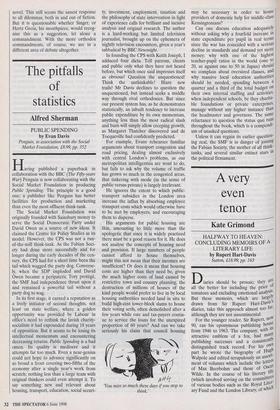In the steps of Zola
Anita Brookner
SHADOWS ON THE HUDSON by Isaac Bashevis Singer, translated from the Yiddish by Joseph Sherman Hamish Hamilton, 176.99, pp. 548 0 riginally published in instalments in the Jewish Daily Forward in the 1950s, this novel, although inferior to his masterpiece The Family Moslcat, confirmed Singer as a major author. He was awarded the Nobel Prize for Literature in 1978, a singular honour for a writer in an almost defunct language. Shadows on the Hudson is entire- ly representative of Singer's loyalty to his forebears, the pre-war Jews of Poland, in whom the spirit of Ecclesiastes was still alive. Yet such Jews as escaped and made their way to America, where they prospered, fared no better than their pre- decessors, tormented as they were by mem- ories of the archaic security of home, and also by the dangers of apostasy, uneasily glimpsed at every turn. It would seem, according to Singer, that Wholeheartedness is to be achieved only by reversion to prelapsarian observance, Which is itself achieved only with difficulty. God may be undeniable, but God is also unverifiable. The chosen strategy, chosen here at least, is to behave as if religious Precepts can be taken at face value. That this may lead to a complete delusional sys- tem with which human nature is rigorously at odds will be the alternative danger, though this may be persuasive. It is persuasive to Singer's characters, who yearn haplessly for readmission to the fold. Less a novel than a profession of faith, Shadows on the Hudson begins as a worldly fiction. An evening gathering is taking Place in the Upper West Side apartment of Boris Makaver. The guests include Makaver's daughter, Anna, an attractive woman of 34, and Hertz Grein, an invest- ment broker, who is in love with Anna. Both are married, but not to each other; in addition Grein has a mistress, Esther, from Whom he has no wish to free himself. Grein and Anna leave the party together, and an authentic note of mutual attraction is sounded, although this too has theological overtones: is the distant God also con- tained in Nature ? If so all is permitted. , That it is not permitted is demonstrated Dy the bad luck that is immediately visited on guilty and innocent alike. Sexy, crazy, Bible-haunted, they are capable not only of flagrant carnality but also of philosophical speculation: if the Jews turned the other cheek for 3,000 years were they then Chris- tian avant la lettre? Argumentative, even at their frequently sublime devotions, they do not recognise the validity of doubt. Yet for them there can be no certainties. Superstition sees death and illness as signs from above. Even the doctor, a relatively level-headed fellow, is unconvinced on this matter. A wild, unreasoning thread invades both belief and disbelief; nights are sleep- less, agitated; elopements are undertaken on the spur of the moment; excess is embraced; but even this sits uncomfortably on the ever-vigilant, ever-remorseful protagonists.
It is something of a guilty relief to the reader that the most reprehensible charac- ters are the most viable. Esther's expostula- tions, her unabashed candour, are matched by those of Kotik, Anna's first husband, an actor who once flourished in Europe and who now has an unexpected success on the New York stage.
In Germany I had to play a Jew who spoke bad German, in Russia I played a Jew who spoke bad Russian, in Poland a Jew who spoke bad Polish, and now in America, inevitably, I get to play a Jew who speaks bad English. There has to be something I do badly before I can get onstage — that's my luck.
These are the Jews of the Fifties, after the Holocaust and before the psychological watershed of the Six Day War, and the common mood is one of defeat. Yet it is practical Anna and hysterical Esther who survive, pitting their wits against the fate they have inherited, ripe with reproach, but also with determination. Or is this a sub-text? If so it is warily avoided.
The names of Dickens and Dostoevsky have been pressed into service here. Neither will do, although Singer's charac- ters have the same conception of wrong- doing and penitence, and the inability of the latter to regulate either. Rather it is Zola, in his capacity as manipulator of fam- ilies, whom Singer resembles, chaste, as was Zola, and with the same eagerness to tell his story. The style is straightforward, even simplistic — no subordinate clauses — and yet it is mesmerising. Only towards the end, when faith creeps towards delu- sion, does the reader part company with the author. These matters are not readily contained in a fiction. Perhaps they are not easily contained anywhere. And yet it would be a pity if Singer were simply preaching to the converted.
If the utterly determinist Singer owes much to the utterly determinist Zola per- haps one might allow Zola the last word. 'AlIons travailler,' says one of Zola's characters, Bongrand, at the funeral of Claude Lantier, the mad painter whose obsessions seem to have invaded Singer's novel. This still seems the sanest response to all dilemmas, both in and out of fiction. But it is questionable whether Singer, or Hertz Grein, his mouthpiece, would recog- nise this as a suggestion, let alone a commandment. With the more orthodox commandments, of course, we are in a different area of debate altogether.



























































 Previous page
Previous page